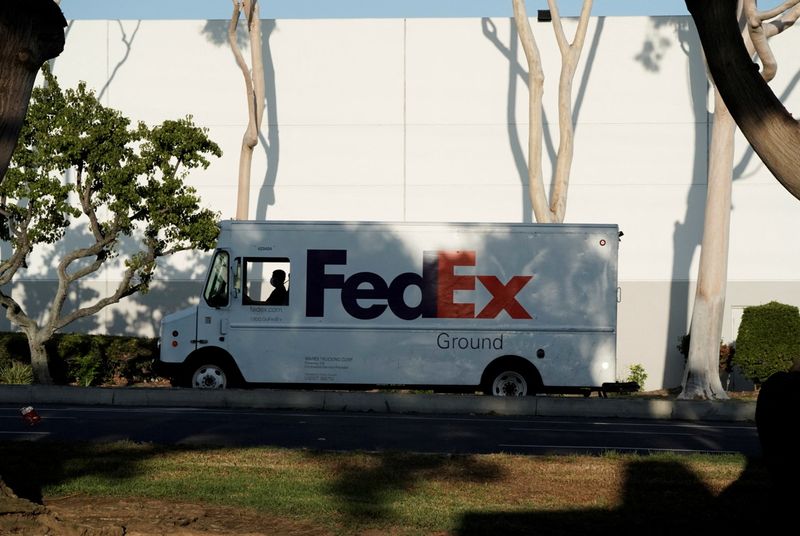By Lisa Baertlein
LOS ANGELES (Reuters) -The FedEx Corp division that handles most of the company’s e-commerce deliveries expects to lower volume forecasts to reflect its customers’ plans to ship fewer holiday packages, according to an internal memo obtained by Reuters.
The confidential message sent to the 6,000 independent contractors that handle delivery and trucking for FedEx Ground in the United States follows the global shipping giant’s Sept. 15 withdrawal of its full-year forecast due to an unexpected first-quarter profit drop of more than 20%.
FedEx shares fell more than 3.2% to $150.21 after Reuters reported the news on Friday.
“We expect there to be downward adjustments to volume forecasts,” Paul Melander, a FedEx Ground senior vice president, said in the message to the unit’s delivery contractors earlier this week. The new forecasts will be released on or about Oct. 21, he said.
“These changes will reflect the latest information from customers about how they anticipate current conditions are likely to decrease their volumes this holiday season,” said Melander, who added that FedEx will further revise volume forecasts as warranted leading up to the start of the Christmas package delivery season.
FedEx in a statement declined to elaborate on its message. The company said it is working with customers to ensure it is prepared for the peak holiday delivery season.
FedEx Ground is the company’s second-largest and fastest-growing division. It delivers online orders for Walmart, Chewy and other retailers.
Over the last two weeks, more than a dozen Ground delivery providers told Reuters that their volumes are down anywhere from 5% to 15% so far this year versus the same time in 2021. Many said the company’s holiday forecast was overly optimistic for the second year in a row.
FedEx’s Ground contractors have been pushing back against company policies and contract changes that have eroded their margins. At the same time, the U.S. last-mile delivery industry is starting to grapple with profit-sapping excess capacity.
FedEx leadership blamed the company’s recent financial setbacks on economic conditions that rapidly deteriorated in late August. Investors and analysts were skeptical, pinning much of the blame on the company’s slow response to softening demand.
The pandemic’s online shopping boom has been unwinding in the months since U.S. consumers shed protective masks and shifted spending back to brick-and-mortar stores, travel and entertainment. Record inflation has further dampened demand for goods ranging from sofas to sneakers as higher costs for housing, food and fuel drain disposable income.
Walmart, one of FedEx’s largest customers, in late July warned that its shoppers were cutting back purchases of nice-to-have goods as prices for necessities surged.
FedEx’s more profitable rival United Parcel Service declined comment for this story, citing the quiet period ahead of its earnings report on Oct. 25. UPS leadership stood by company forecasts in analyst meetings in late September.
(Reporting by Lisa Baertlein in Los Angeles; Editing by Emelia Sithole-Matarise and Chizu Nomiyama)
